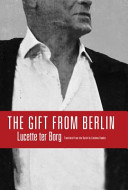home
current issue
featured poet
poem of the week
lives of the poets
poetry near you
reviews
archives
subscribe
donate
about us
contact us
A Gift Horse
reviewed by Linda Rogers
 The Gift From Berlin
The Gift From Berlin
Lucette ter Borg
translated from the Dutch by Liedewy Hawke
Cormorant Books
Lucette, in almost any European language, means light. This novel, which was awarded the 2005 National Dutch Debut Prize, is about repatriation of the heart, how, in the process of refraction and translation, the many struggle and sometimes fail to be one. The poet Shelley, in his finest lines reminded us that, “Life, like a dome of many coloured glass, stains the white radiance of eternity.”
The stain that colours every page of this book is the Third Reich.
Lucette, the writer, set out on a quest to understand the maternal branch of her family. That journey took her across Europe and over to Canada, where many refugees of the Holocaust found refuge.
In any dysfunctional relationship both the abuser and the abusee are damaged. There were many Jewish refugees in my class at University Hill School, both from the Holocaust and later from the Hungarian uprising in Budapest. None of these children were German. The Germans had gone elsewhere, to the hinterland where they anticipated the possible rehabilitation of their national romanticism.
My German Canadian writer friends, Harold Rhenisch and Andreas Schroeder, descended from Mennonite dissenters who had chased a Utopian dream to Canada, suffered isolation as children because of the sins of their perceived compatriots. It often felt as if they had no homeland.
Many German refugees were attracted by the Romantic splendour of the BC Interior, the Cariboo, Chicotin and Okanagan regions. This is where Andreas, the narrator of this tale of loss and thirst for redemption, ends up, in Horsefly, a small town where he can hopefully, with the help of his son Wolfgang begin the process of dying with a clear heart.
A gamesman, former groundskeeper of large estates in Germany and good amateur pianist, Andreas has no blood on his hands. He is guilty by association, both with his countrymen, and his wife, an adored singer and protégé of the fuehrer, who gave her a Bechstein piano at the beginning of World War 2.
“O Freunde, nicht diese tune,” “O friend, not these sounds,” the poet Schiller wrote the words for Beethoven’s famous “Ode to Joy,” perverted for its own purposes by the Third Reich. The tune still plays in Andreas’ ears as he visits and revisits his blemished past in his small cabin crowded by the large piano, which arrives in a crate from Berlin. The piano is the elephant in his room.
The gift from Germany is a Trojan horse dressed as a piano, its melodic insides polluted by memories of betrayal. Gift, I was once reminded, means poison in German.
When we find out that Hitler has had his initials inlaid over the keyboard so that Elisabeth’s singing and playing might be inspired by proximity to the tyrant, we discover the full complexity of Andreas’ quest to transcend the heart of darkness.
Elisabeth died of cancer. Cancer had invaded Germany and spread all over Europe.
Can Andreas stop its progress by translating his German Romanticism to the Canadian wilderness? Of course not; he too has a malignancy. Like the fuehrer, he failed his children, abandoning them for Hitler’s siren, the woman who sang the music he loved.
Several generations of Germans have now had to repudiate the past, which means their own antecedents. We know, as Andreas begins to plan his ninetieth birthday, that his children in Germany will not likely make the journey to join his awkward celebration. He let them down and they are programmed to repeat the pattern. There is no forgiveness for violation of the family.
We are not sure at the end if Wolfgang has pretended to go pick up his siblings at the bus from Vancouver in denial of the schadenfreude they are playing with an old man with selected memories, or if they are really coming.
This is the time of judgment for the man and for the culture that produced such hubris. Can such heinous crimes be transformed? No one is above the laws of nature, not even musicians. Andreas has lost himself, and no one is obligated to find him.
Linda Rogers is Victoria’s Poet Laureate. Her new novel, The Third Day Book, sequel to The Empress Letters, and a book of poetry, Muscle Memory are now available in bookstores.
This review first appeared in Pacific Rim Review of Books #20